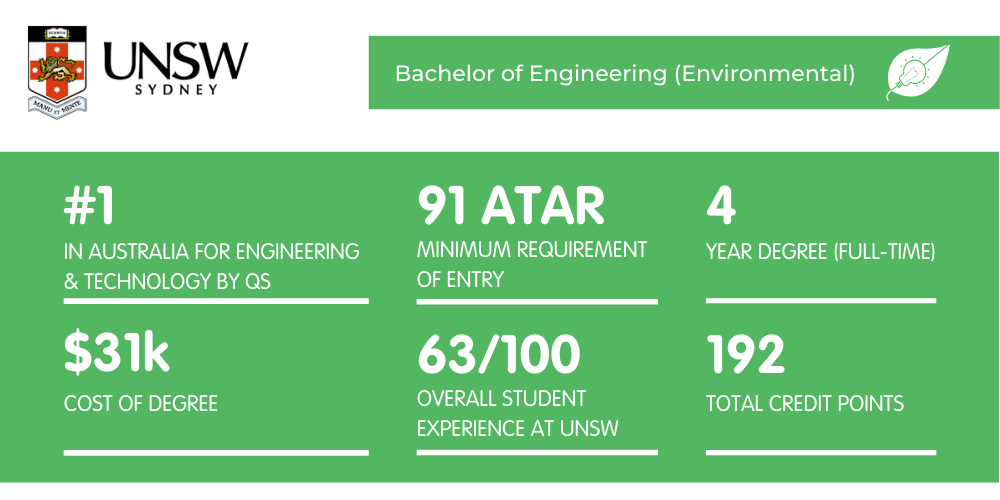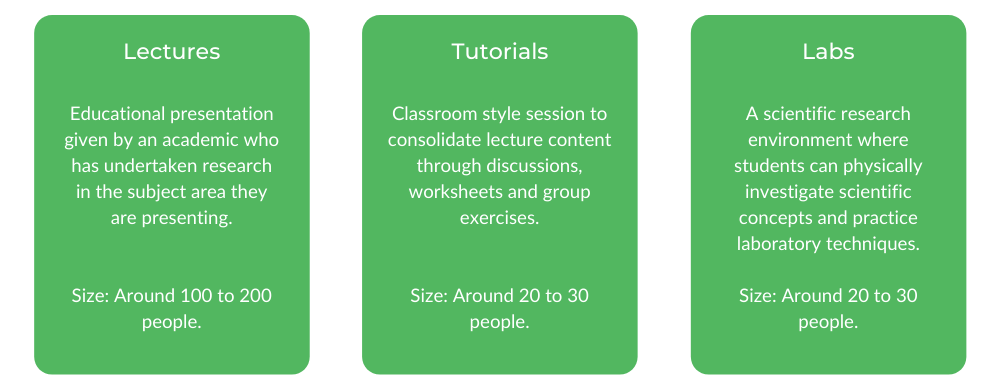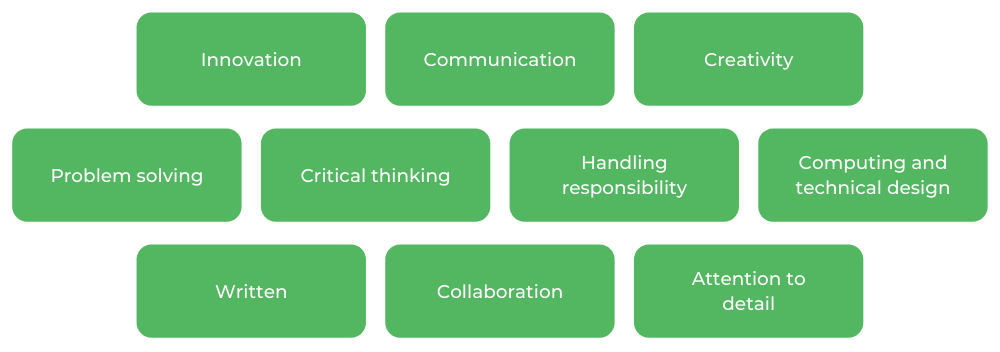Wondering what UNSW Environmental Engineering is all about? Maybe you’ve even envisioned the degree for yourself?
Either way, you’ve come to the right place!
We’re going to walk you through the units, culture, assessments, and what it’s really like to study a Bachelor of Environmental Engineering at UNSW.
Keep scrolling!
What is a Bachelor of Engineering (Environmental) at UNSW?
Core Units for this Degree
How to Get into Environmental Engineering at UNSW
What’s the Teaching Format?
What’s the Faculty and Culture Like?
What is a Bachelor of Engineering (Environmental) at UNSW?
To start, Environmental Engineering is a relatively new discipline that studies the impact that humans have made to the natural environment and the ways to manage and alleviate these effects. Environmental engineering involves the development of infrastructure to improve waste disposal, public health, water contamination, air pollution and water supply.
This degree encourages students to create sustainable and impactful innovations to conserve the natural environment. You’ll gain extensive knowledge in the potential of engineering to identify solutions to conserve the environment by combining biology, ecology, geology, physics and chemistry!
Honours
Environmental Engineering at UNSW is actually only offered through an Honours program. This means that once you enrol, you’re committed to completing 4 years of study — this includes the 3-year undergraduate program as well as an extra year of additional study where you’ll undertake advanced classes as well as completing a long-term thesis or research project.
Graduating with an Honours degree is a great way to widen your knowledge and skill set as well as improving your employability so that you’re one step closer to securing your dream profession.
Can this degree be studied in conjunction with another?
Yes! At UNSW, you’re given the opportunity to combine your Engineering degree with the following courses:
-
- Bachelor of Arts
- Bachelor of Advanced Mathematics
- Bachelor of Advanced Science
- Bachelor of Commerce
- Bachelor of Music
- Bachelor of Laws
- Bachelor of Computer Science
As you can see, you’ve got a lot of options and these aren’t even all of them! You can take a deeper look for yourself here.
Career Paths
UNSW Environmental Engineering is a specialised degree that will set you up for some pretty important professions in environmental and sustainability sectors. You may want to work within industries like:
-
- Water
- Construction
- Energy
- Manufacturing
- Government positions
With a degree like this, you’ll most likely be extremely involved in governmental, private or public environmental initiatives. Maybe you’d be a consultant in a water company that focuses on water loss strategies, or maybe you’ll be designing the next big recycling project.
You’ve got a lot of options, most importantly, your skills will be valued in great programs that conserve and protect our natural environment!
Core Units for this Degree
The Bachelor of Engineering course at UNSW is worth a total of 192 credit points. This accounts for the 168 units designated towards your major stream which, in this case, is Environmental Engineering.
Credit points are the way in which universities measure the workload of particular subjects.
Most of the subjects in the undergraduate Engineering program at UNSW are worth 6 credit points each — this means that, overall, you’ll be taking approximately 32 classes across your 4 year program. Although, this system gets a little trickier as you begin your Honours year.
You can take at UNSW’s Handbook for Environmental Engineering right here!
Here’s a breakdown of what your program structure as an Environmental Engineering student will look like:
-
- You’ve got 168 credit points in your Environmental Engineering stream to complete
- Alongside this, you’ve got 12 credit points from the General Education subjects
- Finally, 12 credit points worth of Discipline Electives
This means that over your 4 years as a UNSW student, you’ll take about 28 subjects in your Environmental Engineering stream, 2 general education subjects and at least 2 elective subjects. We’ll dissect this further now!
Environmental Engineering Stream
Your Environmental Engineering classes are generally pretty prescriptive and structured throughout your degree. You’ll get to choose a few of your classes but for the most part you’ll be following the same structure as the rest of your cohort.
This is great for two reasons. Firstly, it means that we can explain some of the classes you can expect to take and secondly, it means that you’ll be scoring yourself some pretty long-term friends since you’ll all be doing the same classes! Yay!
Your core classes as a first year Environmental Engineering student include:
| Subjects | Description |
|---|---|
| Ecology, Sustainability and Environmental Science | This subject will provide students with an introductory understanding of a range of biological concepts that relate to our natural environment and draws the ways we can create sustainable solutions to environmental issues. |
| Introduction to Engineering Design and Innovation | In this fundamental engineering subject, you’ll be taught the importance of design and creativity to develop solutions to environmental and social issues. |
| Computing for Engineers | In this foundational computing subject, you’ll develop an understanding of the ways in which engineers use computers to program and problem solve. You’ll learn about topics like algorithms, data types, coding, simulation, animation and programming. |
In your first year, you’ll also be completing some maths, physics and chemistry classes. For these classes, you’ll have the option to choose between an advanced version or a standard version.
General Education
As we mentioned, you’re required to take 12 credit points worth of General Education subjects throughout your engineering degree.
This is only really two subjects so it’s not a major part of your degree but it’ll give you a chance to branch out and widen your knowledge since there are so many options. Some of the general education classes include:
| Subjects | Description |
|---|---|
| Environment and Society | This is a class that emphasises the need for urgent solutions in the current state of our environment. In this subject, you’ll be taught societal ideas surrounding human impact like urban development, political systems, energy access, food production and the effects of particular economic and cultural needs. |
| Global History: Exploring the First Globalisation | This is a humanities-based subject perfect for students wanting to learn more about the connection between climate change and environmental issues with the human impact of globalisation and colonialism. You’ll learn about how the modern world developed alongside the growth of civilisation. |
| Sustainable Design: Theories and Practice | This class is all about the development of sustainability theories and their effect on design and innovation since the Industrial Revolution. This subject would be great for engineering students wanting to refine their sustainable and environmental approach to invention. |
The examples above were chosen with an Environmental Engineering brain in mind, but there are plenty of options that go beyond this area which you can check them all out for yourself here!
Discipline Electives
This is the final type of subjects that you’ll undertake throughout your Environmental Engineering course. While these subjects are extremely flexible because there are so many options, they are dependent upon the discipline or major that you decide to take.
Since we are focusing on Environmental Engineering, some example of the electives you can take include:
-
- Sustainability in Construction
- Human Factors in Civil and Transport Engineering
- Air Quality and Pollution
- Fundamentals of Humanitarian Engineering
- Hazardous Waste Management
- Coastal Engineering
- Catchment and Water Resources Modelling
- Rock and Slope Engineering
- Fundamentals of Traffic Engineering
- Groundwater Resource Investigation
- Satellite Remote Sensing and Applications
You can take a look for yourself if you scroll down to ‘Discipline Electives’ here!
Is practical experience included?
Yes! At UNSW the initiative is called the Industrial Experience Requirement which is a program that requires Engineering students to complete a minimum of 60 days industrial training to graduate.
Engineering is such a practical profession that UNSW is well aware that employers are looking for graduates who have had experience in the workforce. It’s an initiative that enables students at UNSW to participate in an organisation as part of a recognised placement program.
You’ll have to work with a supervisor to get your placement approved and submit an application. It’s a great way to enhance your network and gain some real life experience for the resume!
How to Get into Environmental Engineering at UNSW
To be eligible to apply for UNSW’s Bachelor of Environmental Engineering, you’re looking at a minimum ATAR of 91. However, don’t even stress if you haven’t quite gotten the required ATAR because UNSW offers an alternative pathway for students who’ve achieved a minimum ATAR of 81.
Alternate Pathway
UNSW’s Faculty of Engineering Admissions Scheme is a program designed to evaluate a student’s maths, physics, problem solving and design skills rather than purely an ATAR. UNSW understands that your abilities and passions go far beyond an HSC mark so if you’ve scored within 10 points of the Environmental Engineering’s ATAR cut off, you should look into the scheme.
To apply, you’ll need to submit your Year 12 marks, write a personal statement and upload a video to showcase your suitability to the course. This process is also required from students hoping to transfer into UNSW. So, if you want to study engineering at UNSW, there’s a way to get there.
Assumed Knowledge
While there isn’t technically any required knowledge to be eligible for the Environmental Engineering course at UNSW, there are a couple of subjects that you’re assumed to be confident in. These include HSC level Extension Maths and Physics
If you didn’t complete these subjects, there is still no need to stress. You’ve got a few electives to complete so you can always look into taking some particular classes that will help you hone in on these skills.
You can take a deeper look at your subjects here!
Although if you are currently choosing your Year 12 subjects, you may want to consider taking a high level maths, physics and any other science because your performance in these is what UNSW takes into account if you apply through the alternative admissions scheme.
Scholarships
UNSW offers a range of scholarships for potential Engineering students. You just need to find the perfect one, register, complete an application and submit it! You can browse the scholarships on offer here!
What’s the Teaching Format?
A pretty well known characteristic of UNSW is its trimester system as opposed to the standard semester format. UNSW now operates through a 3 session system so you’ll be getting about 10 weeks in 3 different sessions throughout a year.
It’s often seen as a bit of a controversial decision and you can either love it or hate it. Sanmugi, who’s a second year environmental engineering student, says it really isn’t as much of a concern as she expected it to be — in fact, she’s managed perfectly fine.
“Honestly I haven’t had much of a problem with it. That was my number one concern before starting at UNSW because I was thinking ‘oh my gosh I’ll never meet up with my friends again’ but you’re not going to uni every day so you can meet up with friends whenever you want.
I’m also starting work at an engineering firm, and they were looking at my availability and they really liked the trimester format because they thought it was more flexible than the two semesters.” — Sanmugi Sivakumar, Bachelor of Engineering (Civil and Environmental) II at UNSW
So, there you go. Of course it’ll differ for everyone but it’s great to know that you’ll still be able to socialise and employers may even prefer the flexibility!
How often will you need to be on campus?
While it’s usually dependent on the subject, most of your classes in Environmental Engineering at UNSW will involve a lecture, tutorial and a lab class.
Each of these are around 1 to 2 hours long so to account for these classes and some extra time that you might spend studying, you’re looking at being on campus for about 13 hours each week which may sound a little daunting but don’t worry, time will fly by.
Because of the trimester format, you’ll be taking a max of 3 classes each session which will probably make students from other unis a little jealous.
Class Structure
Lectures
The lectures at UNSW are typically 1 to 2 hours long (depending on the subject) and you’ll be expected to attend 1 for each of your weekly classes. You’ll probably be in a lecture theatre with around 100 to 200 students at a time.
A lecture is a kind of passive class that introduces the topics and material that you’ll be focusing on in that week. It’s the perfect time for some good ol’ note taking and a great time to develop a good foundation to inform the upcoming tutorials and labs!
Tutorials
Similar to lectures, these classes are around 1 to 2 hours a week depending on the unit and you’ll be sharing a class with around 20 to 30 students at a time.
Again, there’ll be a tutorial for each of your weekly subjects and these are a participative class that develops your weekly material and will give you a great chance to lead discussions, ask questions and get your head around things.
Labs
Lab classes are there to give you a chance to actually apply the knowledge that you learned throughout the week in a practical, hands-on session. These classes will look pretty similar to tutorials with around 20 to 30 students in each lesson and you’ll often be doing partner or group work.
A lab class will allow you to be engaged and involved in a class and you’ll get a chance to turn theory into practice!
Assessments
“The assessments are very dependent on the course. The more mathematical ones are often related to lab work. You’ll usually have a report to do after the lab related to the calculations you did.
You also have some which are sometimes just a bunch of workshop questions where you get to apply the things you’ve learned. In terms of environment subjects, you do have to write a lot of reports. Reporting is pretty important. You do need writing skills.” — Catherine Trinh
You can expect your assessments to vary quite a lot throughout your degree. For your more science-focused classes, you’ll be tested on your ability to work in a lab, your lab reports and your knowledge of equations.
Whereas, your environmental classes will generally use a lot more writing skills like researching environmental law and policy, writing up reports and understanding the requirements of sustainable development.
Skills That You Refine and Learn
As a student in the Environmental Engineering course at UNSW, you can expect to develop a wide scope of skills that will come in handy in a later environmental, engineering or scientific profession in the future!
A skill that is often overlooked by aspiring Engineering students is their writing ability. While it is easy to get distracted by engineering’s emphasis on numbers, maths, physics and equations, in reality, writing skills are equally as important.
So, don’t neglect them if you’re in high school! You’ll be needing them to write reports, gather information, research environmental issues and understand policies and compliance — it’s all very important.
As an Engineering student, you can also expect to be constantly developing your creativity, innovation and originality throughout your degree. You’re often going to be graded on your ability to come up with and construct designs.
Learn about the pros and cons of UNSW Environmental Engineering here!
What’s the Faculty and Culture Like?
As an Environmental Engineering student, you’ll be positioned in UNSW’s renowned School of Civil and Environmental Engineering. It’s the second largest school in UNSW’s Engineering Faculty which is the largest engineering faculty in Australia and spans across 8 schools!
UNSW’s School of Civil and Environmental Engineering serves over 2000 undergraduate students so you can be confident that you’ll be in safe hands.
The Environmental Engineering cohort and faculty are a group of innovative, intelligent and caring individuals who you’ll be supported by throughout your 4-year course. You’ll feel constantly supported by students and staff who are always willing to help out in any way that they can!
Societies and Clubs
Arc @ UNSW is the program that offers all of the clubs and societies at UNSW. It’s an initiative run by UNSW students for UNSW students to encourage social events, networking, conversations and ideas!
With over 300 clubs to choose from, you’re bound to find a group just for you, and if not, you always have the option to make your own! Maybe you’d like to join the Civil & Environmental Engineering Society, the Physics Society, Women in Engineering or even Yoga Club. The options are endless!
Resources
UNSW is always there to offer a helping hand if you need it. You can check out the resources for Engineering students here!
Whether you need some help academically, financially, emotionally or socially, the staff and students at UNSW are willing to support you.
You can check out UNSW’s Wellbeing Support Resources here!
Gemma Billington is a Content Writer at Art of Smart and an undergraduate student at the University of Technology Sydney. While studying Journalism and Social and Political Sciences, Gemma enjoys spending her time at the gym or reading about Britain’s medieval monarchy – ideally not at the same time. She currently creates and administers social media posts for Central News and writes for the student publication, The Comma. After completing her undergraduate degree, she hopes to study a Masters of Medieval History and is very excited about the prospect!







